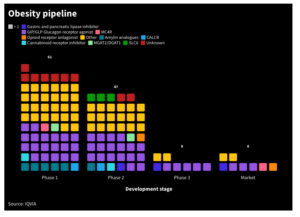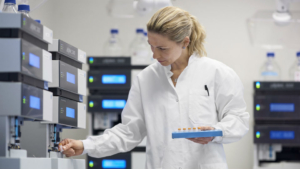
Consortium led by Evotec enters obesity drug space
Drug discovery CRO Evotec SE announced has entered into a partnership with Inserm, Lille University Hospital and Inserm Transfert to screen new biomarkers and targets in obesity and metabolic diseases.
The newly formed strategic partnership between Evotec SE, Inserm, Lille University Hospital and Inserm Transfert aims to identify novel multimodal therapeutic targets that complement incretin therapeutics to treat obesity and diabetes such as GLP-1, GIP or GCC that are already on the market or in late-stage clinical testing. The partnership, which addresses the huge market potential, is build on a growing obesity and metabolic disease-specific biobank that has been established since 2012 and is based on clinical data.
Lille University Hospital is the sponsor of a clinical study entitled Biological Atlas of Severe Obesity (ABOS/DIABOMICS) launched in 2012. Lille University Hospital manages and maintains an obesity-related ABOS Biobank storing cyropreserved specimens and data.
Under the terms of the agreement, Lille University Hospital will provide human biological samples and related clinical data from its ABOS Biobank and collect specific human biospecimens for the collaboration. Evotec will perform various omics studies on cohort samples to generate large omics datasets including transcriptomics, proteomics and metabolomics data to better understand the etiology of metabolic diseases such as metabolic dysfunction-associated steatohepatitis (MASH), obesity, diabetes and cardiovascular diseases. This PanOmics data will be fed into Evotec’s proprietary patient molecular data platform E.MPD, which serves as a central repository for patient molecular data. The data will be analysed by all stakeholders to identify and validate key mechanisms of obesity and other metabolic diseases that are targetd by all major pharma companies including market pioneer Novo Nordisk.
Dr Cord Dohrmann, Chief Scientific Officer of Evotec, said: “Currently, more than 40% of the US population suffers from obesity. The disease poses a major health threat as it is associated with a variety of other conditions such as type 2 diabetes, hypertension, cardiovascular disease, heart failure, kidney disease and non-alcoholic fatty liver disease. The collaboration will help to understand obesity as a disease, which despite recent breakthroughs has not yet been achieved. Expanding our understanding of the key molecular mechanisms that drive disease progression will allow us to identify and develop more effective and safer treatment options than currently available.”
Prof. Francois Pattou, Translational Research Laboratory for Diabetes, Inserm UMR 1190 and Chair of the Science Committee of the Lille University Hospital ABOS Biobank, added: “Collaborating on groundbreaking science with a human data-centric approach gives us a unique opportunity to discover novel treatments for patients suffering from obesity and metabolic diseases.”
The World Obesity Federation estimates that by 2020, obesity will affect around 770 million adults worldwide, and more than one billion by 2030. Obesity is a chronic health condition that increases the risk of heart disease and is linked to many other health problems, including MASH, type 2 diabetes and cancer.
A


 IQVIA
IQVIA
 Momoneymoproblemz - wikimedia
Momoneymoproblemz - wikimedia